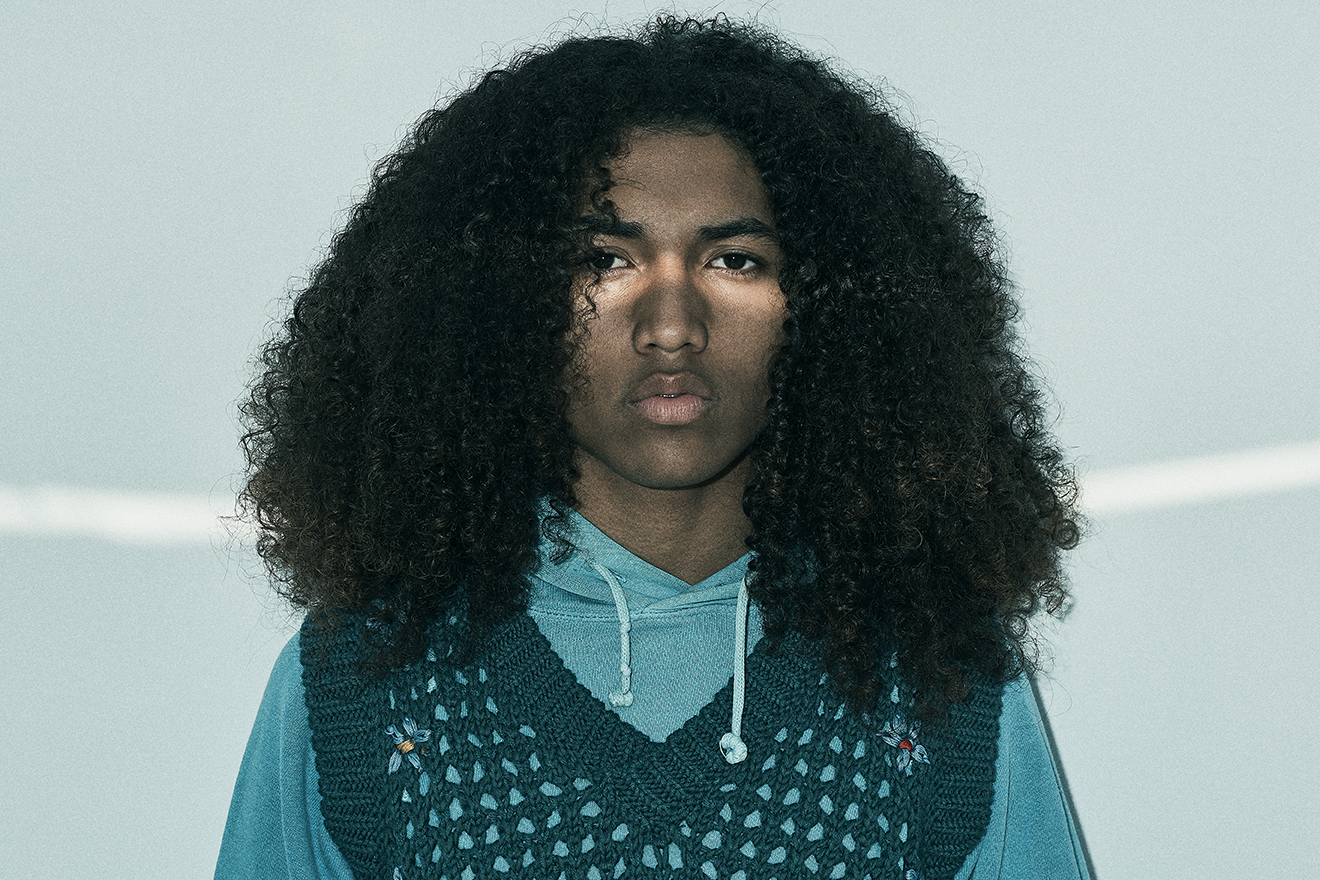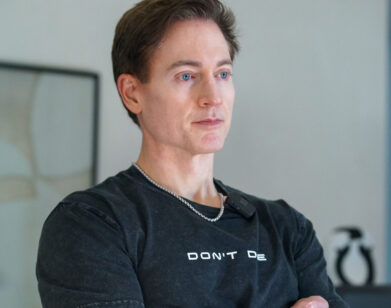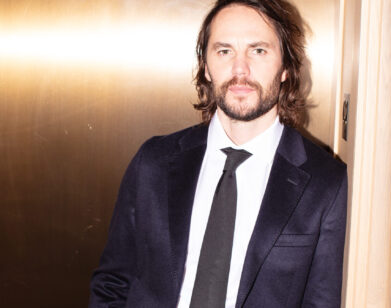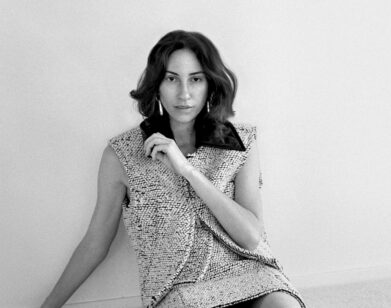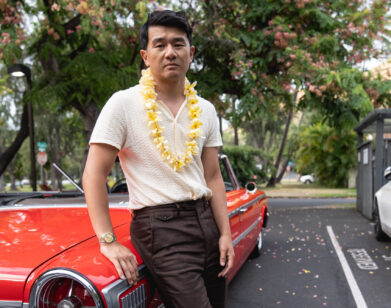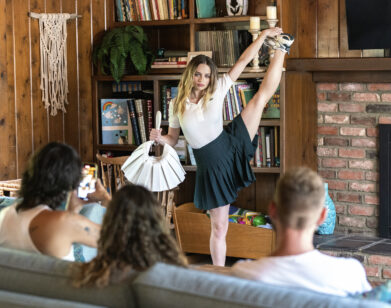Why people are still reeling over the death of The Chi’s Coogie
If you were upset that the young, charming, pitbull-loving Coogie got killed off in the very first episode of Showtime’s The Chi, you weren’t alone. Fans nationwide took to Twitter in mourning and the outpouring of love for the character only mirrors the visceral response of the community affected by his death in the show.
For thousands of people—including the show’s creator Lena Waithe—Chicago isn’t just a battleground, as it’s often portrayed—it’s a home. The Chi sits with this dichotomy, thrusting audiences into the multi-layered lives of the city’s inhabitants and the confusing, all-consuming grief that rears its head when one of them gets taken away too soon. The loss of Coogie is a paragon of that pain. Jahking Guillory, the actor who plays him, is just as lovable; he has a real, tangible connection to the complicated forces playing out on screen.
Guillory grew up in Long Beach, California, bumping to the sharp, barb-wire verses of fellow native Vince Staples and trying to finesse his way to success in classrooms and out on the football field. Gang violence was a siren’s call, always beckoning in search of new recruits, but thanks in no small part to his mother, Guillory dodged that lifestyle and landed himself a burgeoning career in Hollywood. He is quick to remember his roots, and draws on his experiences in and around his hometown hood to bring complex representations of often stereotyped people to life on screen.
His breakout role in Justin Tipping’s Kicks [2016] had him play a teenage sneakerhead in Oakland who turns to desperate measures to reclaim a pair of Air Jordans stolen from him by a neighborhood gang member. Flash forward two years and Guillory is dealing with similar themes in his latest project, Netflix’s coming of age original On My Block. He plays the part of Latrelle, a young gang member fresh out of juvenile detention in South Central Los Angeles.
It is clear Guillory is one of the faces of a new generation of diverse Hollywood talent. The young actor is only 16 but, alongside peers like Storm Reid, Alex Hibbert, and Quvenxhané Wallis, he’s building an iron-clad résumé. You might want to pay attention; you’re witnessing the induction of Hollywood royalty.
NGOZI NWADIOGBU: Would you cut your hair for a role?
JAHKING GUILLORY: If the price is right, most definitely. But I’m not going to cut it just to cut it. I got insurance on my hair.
NWADIOGBU: Really?
GUILLORY: Nah, I’m playing. [laughs] If I was to accept a role and if I had to get more into character with cutting my hair then that’s a sacrifice that I’m gonna have to do. If people don’t like it, they’re gonna like the way I portray the character.
NWADIOGBU: It’ll always grow back.
GUILLORY: Exactly. My hair is my image, of course, but my hair is not me. It’s not my ability to portray a character, it’s not my acting ability—it’s just a look. It’s kind of like an accessory. It’s a part of me, of course, but if I cut my hair I’ll still be the same actor. Nothing changes. I’m damn sure not just a head full of hair and a nice face, you know what I’m saying? My performance is everything. I’m an actor.
NWADIOBU: How do you go about preparing for your roles?
GUILLORY: Every character is different. You can’t really go about it the same way that you would for another character. It’s a whole new path, a whole new direction you have to take and learn and understand in order to actually feel the character, not be the character but feel the character. I’ll give you an example. I didn’t grow up in the hood necessarily but when my parents separated it kind of pushed me to the hood. I didn’t really get into that whole lifestyle, I was focusing on sports and school. But I looked at my cousin, for example—dude is a bad boy, I guess you could say. I just used pieces of my cousin to play Latrelle. With Coogie, I was just being my fun, energetic self. With Brandon [from Kicks], I kind of related to that character a lot, I was the outsider at that point and time in my life. That’s when the separation happened and that’s when I was a kid, [moving] from a house to a two-bedroom apartment with ten people. Like, “Alright, I’m kind of the outsider in this neighborhood.”
I fit in with sports, with how good I was at playing football, that was my only similarity. Man, there’s so much talent in the hood. Everybody is talented but they just fall, they’re a victim of their society. They get into the wrong stuff. You see dudes riding around in flashy cars, got the baddest chick around, they say, “Alright, I want to be like that,” and they throw that whole football stuff out the window when, in reality, school and sports is pretty much the only way a young black kid can make it out.
NWADIOGBU: What pushed you toward sports and acting instead of that other stuff?
GUILLORY: To be honest, my mom. I feel like my mom instilled in my brain, from when I was a kid, that too much bad is not going to be good, it’s not going to work out in the long run. Let me give you an example. I’ma go Pablo Escobar, Frank Lucas and all them, Scarface, Al Pacino—it’s only good when it lasts but when it falls down, it falls down hard. She instilled that in my mind. I was focusing on school and sports. I saw Michael Vick, I liked watching him, Victor Cruz, receiver on the Giants. I don’t know, I was that kid. I wasn’t focused on the guns or the money—well I was focused on the money, don’t get me wrong, I was focused on the money most definitely, I was focused on the girls too, but that’s not really on the point.
My mom, she started me on the path. My dad started me on the path also, but when the whole separation happened my mom played both roles. My family, and just waking up to being the man of the house, I can’t be no low-life, I can’t be out here trying to teach these kids that gangbanging and selling drugs and all that other stuff is the right way to go when it’s not.
NWADIOGBU: Speaking about growing up in the hood and encountering those challenges so early on, do you see a lot of similarities between yourself and your character on The Chi? Between Chicago and Long Beach?
GUILLORY: Growing up in the hood, I guess you could say there are pros and cons. The pros are it’s a lot of kids that don’t really have family, so they depend on others for family. So you actually get that bond with people because it’s like, “I love you because I don’t have nobody else to love. So I love you like a brother.” The Chi is pretty much Coogie, he’s full of love.
From Long Beach to Chicago, everything is pretty much the same but it has its differences. Both places have gang violence, but in the hood there’s so much love. If you were to drive through any poor part of the city, you drive past these little kids. They’re smiling, having fun. No matter what they’re doing, no matter if they’re playing football, basketball, anything—they’re smiling. There’s so much beauty in the struggle. I relate it to that.
NWADIOGBU: I feel like that’s a big part of what this show tries to get across, how even though there are these shootings happening, there are also just families trying to get by and kids trying to figure out who they are. Another theme is this idea of the ripple effect of our choices. How do you feel about the idea of fate and that our choices will have consequences far beyond ourselves?
GUILLORY: With The Chi, basically, everything after my death is the ripple effects of what can happen to each and every person that is close, or related, or in that community. Everything that somebody does, there’s always a consequence, and there’s always something that happens because of that. So any wrongdoing—it’s that revenge kick. That person’s going to look for revenge.
NWADIOGBU: Young kids across the country are doing really impactful things as far as advocating for gun control. Films and TV shows, too, even if they’re not directly calling for those sorts of things, in having that representation, it’s also political. It’s advocating for some kind of change. Do you think about that when you take roles like these?
GUILLORY: Oh, of course. When you’re reading for a role, you want to learn the deeper message behind it, so I feel like my character in The Chi and my character in On My Block on Netflix‚ this is a kid who’s a victim of his community, a victim of the society he’s been raised in. Same thing with the other characters in the show, when you’re born into a world like that, that’s the only thing that you know.
NWADIOGBU: Music plays a big part in crafting the world of The Chi as well. What are your thoughts on the soundtrack?
GUILLORY: The soundtrack most definitely plays a huge role. It tells a story even more with the story that’s already being told. The song that stands out for me is Chance the Rapper, “All We Got,” because this is all we got. In the black community, we are all we have. We have to have each other because if we don’t have each other then we have nobody. Especially in Chicago, everywhere, we’re all we got so we gotta lift our people, be with our people; all positive vibes.
NWADIOGBU: Uplifting one another and bringing other black people and people of color with you as you thrive is so important. How has it been, on most of your projects, working with a majority black cast?
GUILLORY: Everything that I’ve done, I’m still close with pretty much everybody. With Kicks, I’m still close with Caesar, Chris … with The Chi, I’m still close with pretty much everybody, from Jason [Mitchell] to Jacob [Lattimore] to Alex [Hibbert], everybody. When [my mom and I] were in Chicago, we were there for two months, and my mom was cooking for everybody. She cooked on Easter. Jacob came through, we were all eating, it was very cool, had that family vibe because when you’re in a place where you don’t normally go but you’re with these people that you don’t know, you develop love for them. That bond doesn’t really break. On My Block, same thing.
NWADIOGBU: You’ve been getting more and more attention recently. I’ve seen on Twitter you even have a special name for your fans?
GUILLORY: Yo, call them Jahqueens! I don’t know, now it’s going crazy. I’m getting used to it. I love all my supporters. Everything is going to come very soon and I’m working my butt off, for real, for real. So everybody who’s staying in tune with me and sticking with me, all my Jahqueens out there, most definitely keep messing with me. [laughs] I love it. Especially getting recognized by everybody.
There’s this restaurant called Roscoe’s Chicken and Waffles, shout out to Roscoe’s Chicken and Waffles, every single Roscoe’s I go to, no matter where, in Long Beach, the one on Pico, the one in Inglewood, everybody recognizes me there and I love that. I love getting recognized by my people. I love that love, because I’m telling a story that one of them experienced and now I’m telling it and I’m portraying it, however they relate to it. I just love when people tell me, “Your character did something to me.”
I was just walking on Sunset Boulevard the other day and this person stopped the car and they said, “Ay man, you from Kicks right?” I said, “Yeah.” He said “Bro, I loved that movie.” That’s the only one that stands out in my mind because that’s the first time I was walking and somebody was driving and they stopped traffic. Him and his girl got out, and then the dude in the backseat got out too, and they was taking pictures and stuff like that. That stood out to me because they really stopped traffic and said that. Shouts out to all the Jahqueens out there.
THE CHI IS NOW AVAILABLE TO STREAM ON SHOWTIME. JAHKING GUILLORY’S LATEST PROJECT, ON MY BLOCK, IS OUT NOW ON NETFLIX.

